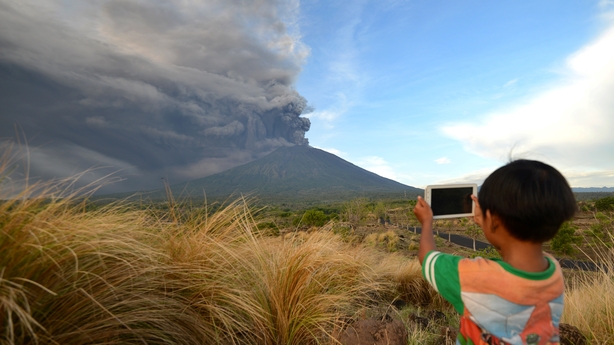A volcano on the Indonesian island of Bali has sent plumes of grey smoke and steam 13,000 feet into the air for the third day in a week, triggering flight cancellations which have left thousands of tourists stranded, officials have said.
Mount Agung spewed smoke and ash as high as 13,123 feet this morning, causing at least 28 departing or arriving flights to be delayed or cancelled, a spokesman for Bali's airport said.
Indonesia's volcanology centre has put out a red alert, warning airlines of a possible eruption, with a likely significant emission of ash into the atmosphere.
We need your consent to load this rte-player contentWe use rte-player to manage extra content that can set cookies on your device and collect data about your activity. Please review their details and accept them to load the content.Manage Preferences
The decision to delay or divert flights was up to individual airlines, airport spokesman Arie Ahsanurrohim said.
"We try to make the airport as comfortable as possible for the passengers affected. So far we have provided special rooms for them to unpack their luggage and video entertainment so they can relax a bit," Mr Ahsanurrohim said.
At least 2,000 passengers are affected by the flight disruption, mostly tourists from Australia.
Several domestic flights have also been cancelled such as to the nearby island of Lombok, also a popular tourist destination east of Bali.
The wind has blown Mount Agung's ash in that direction.
Mount Agung last erupted in 1963, killing nearly 1,600 people.

It rumbled back to life in September and authorities raised the alert to the highest level, forcing 140,000 people living nearby to evacuate.
The volcano's activity decreased in late October and many people returned to their home as the alert was lowered to the second-highest level.
Mount Agung rumbled again last Tuesday, forcing 25,000 people to seek shelter.
Authorities urged people living within 7.5 kilometres of the mountain to evacuate.
The mountain spewed smoke and ash yesterday for the second time in a week in what volcanologists call a phreatic eruption - one which is caused by the heating and expansion of groundwater.
"This time the tremors and quakes caused by the volcano's activities are significantly less than in September," the head of Indonesia's volcanology centre said.
Mount Agung is one of more than 120 active volcanoes extending the length of Indonesia, which straddles the Pacific Ring of Fire.

